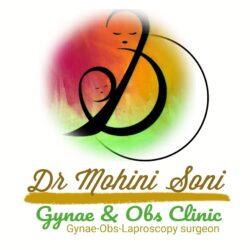Endometriosis is a condition that affects millions of women, yet it often goes unnoticed or misunderstood for years. Many women dismiss their pain as “normal period cramps” and continue to struggle silently with discomfort, irregular cycles, or even difficulty conceiving.
At Dr. Mohini’s clinic in Vasant Kunj, Delhi, we often meet women who have been living with these symptoms for a long time before finding the right diagnosis and treatment. Endometriosis can have a real impact on a woman’s health and quality of life, but with timely care, relief is possible.
In this blog, let’s take a closer look at what endometriosis really is, the symptoms you should never ignore, how doctors diagnose it, and why laparoscopic surgery is considered one of the most effective treatment options available today.
What is Endometriosis?
Endometriosis occurs when the tissue that normally lines the inside of the uterus (endometrium) starts growing outside it—on the ovaries, fallopian tubes, pelvic lining, and sometimes even beyond. This misplaced tissue behaves like the uterine lining, thickening and bleeding during each menstrual cycle, but since it has no way to exit the body, it leads to pain, inflammation, and scarring.
Common Symptoms of Endometriosis
The symptoms of endometriosis can vary widely. While some women may have mild signs, others may experience severe discomfort that affects daily life.
- Pelvic pain – especially before and during periods
- Heavy or irregular menstrual bleeding
- Pain during intercourse
- Pain during urination or bowel movements (often around the menstrual cycle)
- Infertility or difficulty conceiving
- Chronic fatigue and bloating
It is important to note that the intensity of pain does not always match the severity of the condition. Some women with advanced endometriosis may have minimal pain, while others with mild disease may suffer significantly.
How is Endometriosis Diagnosed?
Diagnosing endometriosis can be tricky because its symptoms often overlap with other conditions like PCOS, pelvic infections, or irritable bowel syndrome (IBS).
- Your gynecologist may recommend:
- Pelvic examination to check for abnormalities.
- Ultrasound or MRI to rule out cysts and other conditions.
- Diagnostic laparoscopy – the gold standard for confirming endometriosis.
- Laparoscopy not only helps in confirming the diagnosis but also allows the surgeon to treat the condition simultaneously.
Role of Laparoscopic Surgery in Endometriosis
Laparoscopic surgery is a minimally invasive procedure that has transformed the way endometriosis is managed. Instead of large incisions, it uses small keyhole cuts through which a camera and surgical instruments are inserted.
Benefits of Laparoscopic Surgery for Endometriosis:
- Accurate diagnosis and treatment in one procedure
- Removal of endometriotic lesions and cysts with precision
- Preservation of fertility by clearing adhesions around reproductive organs
- Minimal scarring and faster recovery compared to open surgery
- Reduced pain and hospital stay
For women struggling with infertility due to endometriosis, laparoscopic surgery can significantly improve the chances of conception—either naturally or with assisted reproductive techniques.
When to See a Gynecologist?
If you experience severe period pain, persistent pelvic discomfort, or fertility challenges, it is important not to ignore these symptoms. Early diagnosis and treatment can help prevent complications and improve your quality of life.
At Dr. Mohini’s clinic in Vasant Kunj, Delhi, patients receive advanced care for endometriosis with both medical management and laparoscopic expertise to ensure the best possible outcomes.
Final Thoughts
Endometriosis is a challenging condition, but with the right approach, women can lead healthy, pain-free lives. Laparoscopic surgery remains one of the most effective tools for diagnosis and treatment, offering long-term relief and hope for women dealing with infertility.
If you are looking for an experienced gynecologist and laparoscopic surgeon in Vasant Kunj or Delhi, book a consultation with Dr. Mohini to discuss your symptoms and explore the best treatment options.
FAQs on Endometriosis and Laparoscopic Surgery
Q1. Can endometriosis be completely cured?
Currently, there is no permanent cure, but treatments like medications and laparoscopic surgery can manage symptoms effectively.
Q2. Does endometriosis always cause infertility?
Not always. Many women with endometriosis conceive naturally, while others may need medical or surgical assistance.
Q3. How long is recovery after laparoscopic surgery?
Most women return to daily activities within 1–2 weeks, with complete recovery in about 4–6 weeks.
Q4. Is laparoscopic surgery painful?
It causes much less pain compared to traditional open surgery and offers faster healing.
Q5. Can lifestyle changes help manage endometriosis?
Yes. Regular exercise, stress management, and a balanced diet can help reduce inflammation and improve overall well-being.

